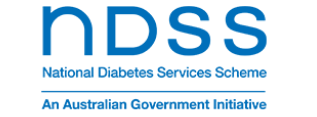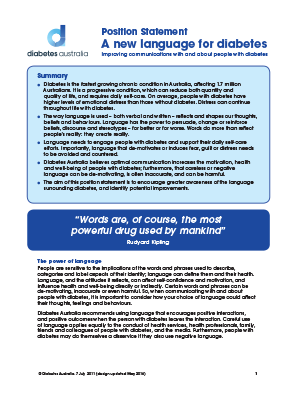Summary
- Diabetes is the fastest growing chronic condition in Australia affecting 1.7 million Australians. It is a progressive condition which can reduce both quantity and quality of life and requires daily self-care. On average people with diabetes have higher levels of emotional distress than those without diabetes. Distress can continue throughout life with diabetes.
- The way language is used, both verbal and written, reflects and shapes our thoughts, beliefs and behaviours. Language has the power to persuade, change or reinforce beliefs, discourse and stereotypes, for better or for worse. Words do more than reflect people’s reality: they create reality.
- Language needs to engage people with diabetes and support their daily self-care efforts. Importantly, language that de-motivates or induces fear, guilt or distress needs to be avoided and countered.
- Diabetes Australia believes optimal communication increases the motivation, health and well-being of people with diabetes; furthermore, that careless or negative language can be de-motivating, is often inaccurate and can be harmful.
- The aim of this position statement is to encourage greater awareness of the language surrounding diabetes and identify potential improvements.
“Words are, of course, the most
powerful drug used by mankind.”
~ Rudyard Kipling ~
The power of language
People are sensitive to the implications of the words and phrases used to describe, categorise and label aspects of their identity; language can define them and their health. Language and the attitudes it reflects can affect self-confidence and motivation and influence health and well-being directly or indirectly. Certain words and phrases can be de-motivating, inaccurate or even harmful. So when communicating with and about people with diabetes it is important to consider how your choice of language could affect their thoughts, feelings and behaviours.
Diabetes Australia recommends using language that encourages positive interactions and positive outcomes when the person with diabetes leaves the interaction. Careful use of language applies equally to the conduct of health services, health professionals, family, friends and colleagues of people with diabetes and the media. Furthermore, people with diabetes may do themselves a disservice if they also use negative language.
Recommendations
In your verbal and written interactions with or about people with diabetes, Diabetes Australia recommends:
- Be aware of the language you use with each person with diabetes and when referring to people with diabetes
- Take your language seriously. Language is personal and so is diabetes. Think carefully about what your words might mean to a person with diabetes and be aware your words may not be interpreted the way you intend.
- Remember language reflects attitude. Do not use different language just because you are talking or writing about people with diabetes rather than with them.
- Remember everyone is different. Some people will object to or be irritated by certain language; others may not. Regardless of an individual’s immediate reaction (or lack of reaction) your language influences how they think, feel and act. Use language most people would find helpful and encouraging.
- Inform but don’t judge. Avoid blame and any language that implies moral judgment about behaviours. Accept and respect that (a) the individual has the right to make choices, (b) he or she has responsibility for his or her own condition and (c) diabetes may not always take priority in his or her life. Your language needs to reflect such an understanding.
- Be understood. Try not to use jargon. Listen to the words the person with diabetes uses and reflect that language. Wherever possible check assumptions, understanding the effect your language has on individuals.
- Take a holistic approach. Diabetes is frustrating, challenging and distressing for many people. Focusing on their ‘non-adherent’ behaviour dismisses the very real efforts they may well be making.
- Focus on the achievable. Wellness and health involve more than just gaining ‘control’; encourage optimal self-management and behaviour change using appropriate and encouraging language.
- Appreciate that the meaning and acceptability of words and phrases change over time. Continually reflect on your language and check your assumptions.
- Remember language creates reality. People with diabetes need to know that their continual efforts to improve their health and self-care activities are worthwhile and valued. Focusing on the positive changes that people make and can continue to make in the future is more effective than focusing on past behaviours and outcomes.



